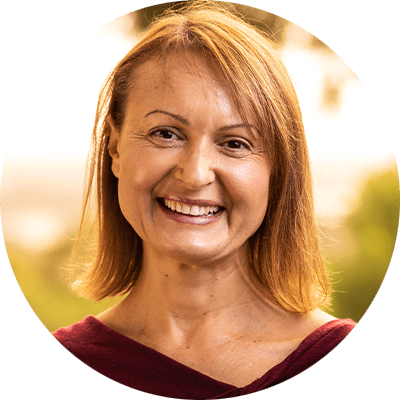Hello my friend in desktop mode.
Hello my friend in desktop mode.
Hello again my friend in desktop mode.
Hello again friend in mobile mode.
Whether obvious dangers such as smoking, to more subtle ones such as not exercising enough, Flinders public health expert Professor Billie Bonevski is creating healthier societies by changing behaviours in high-risk communities.
“The beauty of public health is that rather than trying to influence an individual, you can have an impact across entire populations – you’re not just saving one life, but maybe millions of lives,” she says.
As Professor of Public Health at Flinders Health and Medical Research Institute, she manages a wide-ranging program of research that drives better health behaviours in Australians.
“We develop programs with a focus on the broad picture of what influences people's decisions about their own health behaviours,” Professor Bonevski says. “We aim to increase awareness about health behaviour, and we develop support, resources and tools to make it easier for people to engage in healthy behaviours.”
Professor Bonevski’s work in the past ten years has particularly focused on high-risk populations, such as families with low incomes, people with existing mental health or drug and alcohol problems, and Aboriginal and Torres Strait Islander communities.
One success story is the Tackling Tobacco program, funded by the National Health and Medical Research Council and the Cancer Council NSW. Smoking is the leading preventable cause of disease in Australia, linked with 15 different types of cancer and conditions such as chronic obstructive airway disease.
“Our research showed that while general tobacco control programs had reduced smoking rates across the population as a whole, smoking rates remained high in certain subpopulations,” Professor Bonevski explains. “The next steps were to identify the drivers of smoking behaviours and the gaps in support, and then to develop very tailored programs to address the issues.”
Professor Bonevski says Tackling Tobacco works because it links provision of stop smoking support – counselling, free nicotine replacement therapy and referrals to the Quitline – with social services. Effectiveness has been clearly demonstrated using randomised clinical trials.
“The evidence shows we increased access to quit smoking support through bringing it together with housing support, financial support, drug and alcohol services, mental health services and Aboriginal medical health services,” Professor Bonevski says.
Tackling Tobacco has been rolled out by the Cancer Council NSW and is expanding to South Australia and other states.
Infant and family health can also benefit from behaviour change, such as the Growin’ Up Healthy Jarjums program Professor Bonevski is currently working on with Indigenous communities.
“Closing the gap for Indigenous Australians can be improved through working with Indigenous women, as they drive a lot of health behaviours in their communities,” she says.
“Closing the gap for Indigenous Australians can be improved through working with Indigenous women, as they drive a lot of health behaviours in their communities,”
To start the project, Professor Bonevski and her colleagues worked with five Aboriginal health services in NSW to survey Indigenous mothers of young children and ask them what they wanted and needed. Now, Healthy Jarjums consists of modules delivered through a smartphone app, with links to social media platforms to provide cultural and community connectivity. The modules cover adult issues such as nutrition, physical activity, alcohol, smoking, mental health and wellbeing and women's business, as well as infant and child health information, including developmental milestones, vaccinations and sleep.
“Pre-testing of the modules shows high levels of acceptability in the Indigenous women, and we’re now going to conduct a big trial to formally assess impact,” Professor Bonevski says.
With the project initiated in NSW, Professor Bonevski has obtained funding from the Hospital Research Foundation to culturally adapt the program for Indigenous communities in South Australia.
Behaviour after a major health event can be critical to ensure good recovery and reduce the chance of another incident. Professor Bonevski received funding from the National Stroke Foundation to develop the Prevent Second Stroke program, and the National Health and Medical Research Council funded evaluation through a randomised controlled trial.
“Prevent Second Stroke is a secondary prevention program that aims to provide health behaviour modification strategies to people who have had a stroke and are at risk of having a second event,” she says.
An online program, it consists of modules that target diet, exercise and mental health.
“We had 400 people participate in the trial and found people were really happy to use an online program and that users reported higher health-related quality of life than the control group,” Professor Bonevski says. “Our next step is broader implementation and scale-up of the program in a wider population, which we’re really well-placed to do at Flinders.”
Professor Bonevski says it’s satisfying to do research that is integrated with hospital care and community-based health services.
“Doing research that actually changes people’s health is a real privilege,” she says.
“Doing research that actually changes people’s health is a real privilege,”
Download your free copy of Fearless Research
![]()
Sturt Rd, Bedford Park
South Australia 5042
South Australia | Northern Territory
Global | Online
CRICOS Provider: 00114A TEQSA Provider ID: PRV12097 TEQSA category: Australian University










